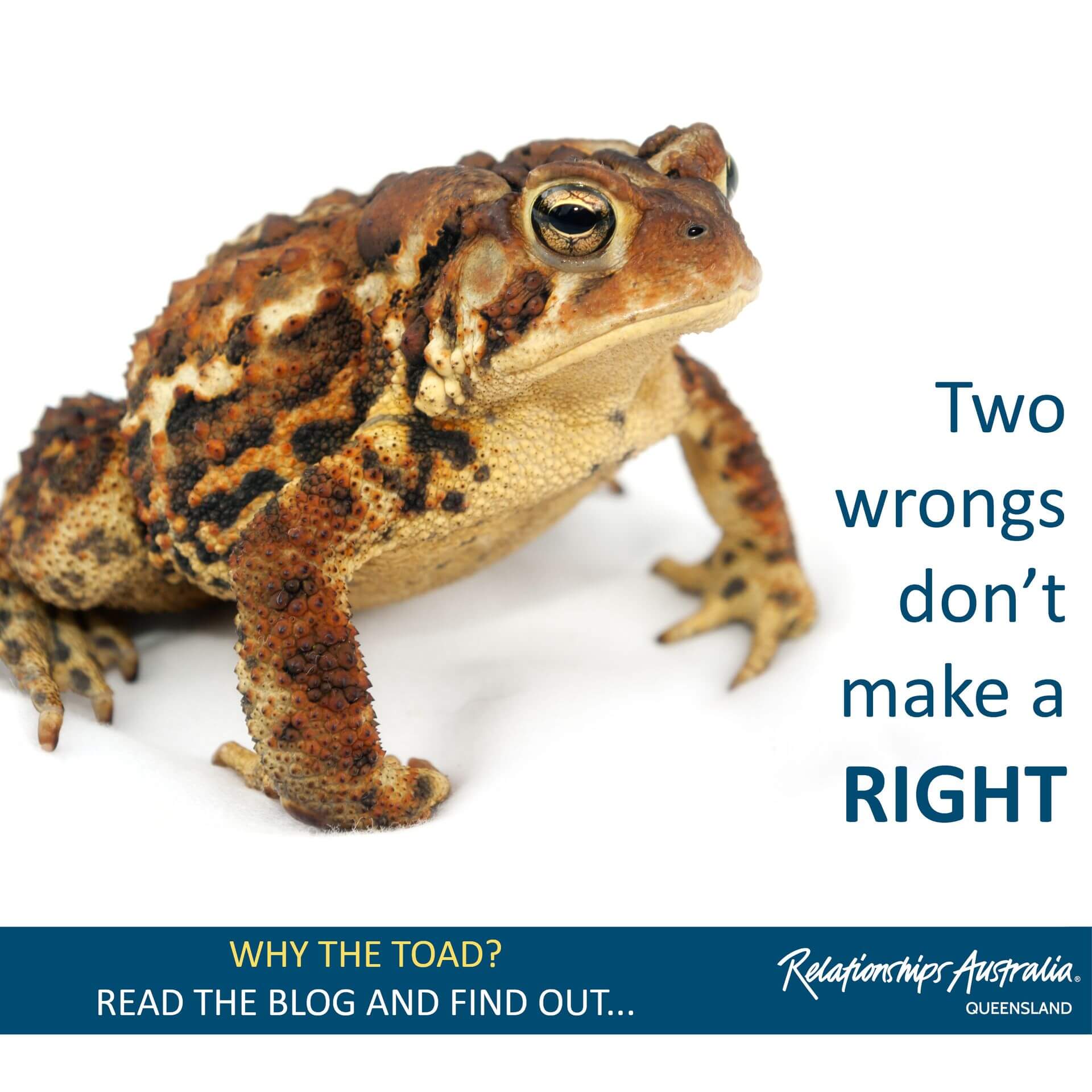All posts
Two wrongs don’t make a right
By Carolyn McBean, Family Dispute Resolution Practitioner Why do reasonable, kind hearted and educated people sometimes behave completely out of character and irrationally when in dispute? Although I don’t have a definite answer to this puzzle, one of the biggest influencing factor I would say is those of emotions, especially frustration and anger. Imagine the […]


By Carolyn McBean, Family Dispute Resolution Practitioner
Why do reasonable, kind hearted and educated people sometimes behave completely out of character and irrationally when in dispute?
Although I don’t have a definite answer to this puzzle, one of the biggest influencing factor I would say is those of emotions, especially frustration and anger.
Imagine the situation where a neighbour claims the other is being too noisy at night and causing him to be sleep deprived. This neighbour decides to tie nuts and bolts to toads’ legs and throws them onto the neighbour’s roof.
Right now most of you are probably giggling or thinking, “Wow what a clever idea,” yet I ask you–how is this going to help ‘fix’ or ‘improve’ the situation?
What would you do if your neighbour threw clinging clanging toads on your roof?
Why would a reasonable, usually kind hearted individual take the time to catch said toads and carefully tie bolts to their legs and then orchestrate getting them onto the neighbour’s roof?
Right now I can hear my mum’s voice saying, “Two wrongs don’t make a right,” or the other old favourite, “If they jumped off a bridge would you?”
In the realm of conflict and dispute resolution these old sayings actually have some validity.
Perhaps the neighbour gains some sense of control by constructing and carrying out the plan with the toads, in possibly an ongoing and immensely frustrating situation. However, what are the long term desired outcomes? Is the neighbour’s goal to simply ensure the other ‘suffers’ as much as they believe they are and has a sleepless night? If that’s so then I think it’s a “tick” because the desired affect is achieved. I don’t imagine there’d be a lot of sleep with clinging clanging toads on the roof in the middle of the night. Yes, it would be reasonable to say that this was more than likely the neighbour’s aim in that moment in time.
Consider though, what was the original goal for the neighbour? They desired sleep, a peaceful night’s sleep. Perhaps their neighbour is being deliberately obnoxious and antagonistic. Even so how does the toad plan work towards achieving their original goal of attaining a peaceful night’s sleep? How do two wrongs make a right?
What might seem like “just desserts” may seriously not achieve your desired final outcome. If you find yourself thinking that some form of retaliation, such as throwing bolt laden toads on the neighbour’s roof, might be called for in a particularly difficult dispute or conflict, please stop and ask yourself if this will help you reach your ultimate goal?
It might be a big ‘tick’ for its success in annoying the other person but a massive ‘cross’ for improving the overall situation… and historically, retaliation usually makes the situation worse.
Okay, you were right mum, “Two wrongs really don’t make a right.”
— Carolyn McBean, Family Dispute Resolution Practitioner @ Relationships Australia Qld
** If you would like help settling a dispute with someone, please call us on 1300 364 277 to find out your options and make an appointment.
BE SOCIAL, SHARE!
This information may help someone you know. Please share this blog by using the orange SHARE link at the top of the page. You can also subscribe to receive future blogs straight to your inbox (using the SUBSCRIBE box on the right of this page).
Back to all posts